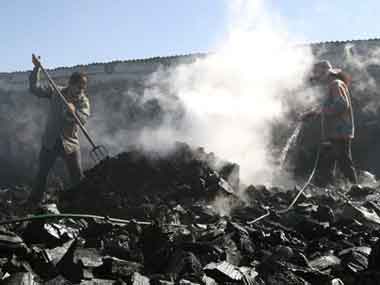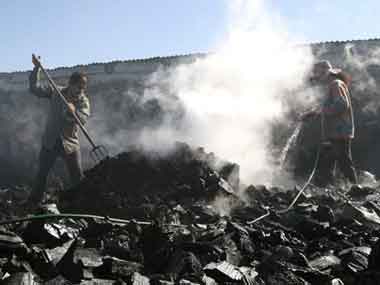The first round of FIRs filed by the CBI in the coal block allocation scandal is already showing up the intricate web of deceit that underlies the flawed allocation from which companies that had access to power circles profited unfairly. But in equal measure, they amount to merely scratching the surface of the scam. The rabbit hole runs much deeper than has been shown up so far, and the CBI’s claim to earnestness in pursuing the case will be on test in the coming days. It has to expand the net to cover the big fish, including the political puppet masters, the bureaucrats, and the big corporates who played the system to their advantage. But the details in the first round of five FIRs confirm all the points that the Comptroller and Auditor-General flagged in his report on the coal scam: that the allocation process was not transparent, as a result of which allocations were made in some cases to companies that had no record of operating in the mining space, and that they profited unjustly from cornering such allocations. [caption id=“attachment_443606” align=“alignleft” width=“380”]
 The rabbit hole of the scandal runs deep. Reuters[/caption] In fact, the FIRs expose another strand to the scandal, which bears an echo of the manner in which the 2G scam was perpetrated: this relates to fly-by-night companies with political connnections, which cornered the coal block allocations by leveraging their clout, and then sold stake - in part or in whole - thereby passing on the coal block allocations that were intended for captive mining. In effect, it defeats the spirit of the provision that the allocations, which were made free of cost, were intended for captive coal mining. The case of Nav Bharat Power, one of the biggest beneficaries of the scam and one of the companies that were raided on Tuesday, is illustrative.
The Times of India
reports that the company was registered in Hyderbad in December 2005 with a paid-up capital of just Rs 1 lakh. Yet, on that small capital base, the company signed a memorandum of understanding with the Odisha government promising to invest nearly Rs 10,000 crore in to power plants. That MoU was signed barely a month after it had secured a 4.7 million tonnes per year coal linkage. In addition, Nav Bharat Power secured an allotment from a coal block in Odisha: the mechanics of that allocation point to the company’s extraordinary clout. Of the 108 applications received for the Odisha block, Nav Bharat Power was one of only six firms that secured allotments: all the others were biggies in the power space. By 2009, Nav Bharat Power had been acquired by Essar Power. In its IPO prospectus in 2010, Essar listed its primary consideration in acquiring Nav Bharat Power: the expectation of access to the accompanying coal bloc allocation." And although it is difficult to arrive at a precise valuation of the acquisition, it is believed to be in excess of Rs 120 crore. In other words, in just over four years, a company with a Rs 1 lakh paid-up capital had leveraged its clout, cornered coal blocks for free, and sold itself over for excess of Rs 100 crore. One other strand from Tuesday’s raids point to to the role of poltiical influence in securing the coal blocks. Three of the five companies that were raided on Tuesday belong to one family: the Jayaswals, based in Nagpur. The various members of the Jayaswal family empire had between them cornered 10 coal blocks, accounting for more than 900 million tonnes of coal - although they had just one project on the ground. (
More details here
.) It appears to have been able to do this owing to one tenuous political connection: one of the directors in one of the group companies was the son of Vijay Darda, the Congress MP (whose brother also serves as a Minister in the Maharashtra government). Curiously, Vijay Darda had been caught up in a controversy not long ago for having praised Gujarat Chief Minister Narendra Modi as a “political saint” and a “tiger”.
That statement had embarrassed the Congress
, and central party leaders had indicated that Darda, a media baron, would face punitive action. Darda subsequently
retracted his remarks
about Modi, but evidently it has not been enough to secure him immunity from punishment. So long as he was a faithful soldier of the party, Darda was able to get away with appears to have been blatant influence peddling on behalf of a business empire with whom his family had organic links. But once you’ve embarrassed the party - by praising its bete noire, in the way that he did - you run the risk of being thrown under the bus when the party has to be seen to be doing something.
The rabbit hole of the scandal runs deep. Reuters[/caption] In fact, the FIRs expose another strand to the scandal, which bears an echo of the manner in which the 2G scam was perpetrated: this relates to fly-by-night companies with political connnections, which cornered the coal block allocations by leveraging their clout, and then sold stake - in part or in whole - thereby passing on the coal block allocations that were intended for captive mining. In effect, it defeats the spirit of the provision that the allocations, which were made free of cost, were intended for captive coal mining. The case of Nav Bharat Power, one of the biggest beneficaries of the scam and one of the companies that were raided on Tuesday, is illustrative.
The Times of India
reports that the company was registered in Hyderbad in December 2005 with a paid-up capital of just Rs 1 lakh. Yet, on that small capital base, the company signed a memorandum of understanding with the Odisha government promising to invest nearly Rs 10,000 crore in to power plants. That MoU was signed barely a month after it had secured a 4.7 million tonnes per year coal linkage. In addition, Nav Bharat Power secured an allotment from a coal block in Odisha: the mechanics of that allocation point to the company’s extraordinary clout. Of the 108 applications received for the Odisha block, Nav Bharat Power was one of only six firms that secured allotments: all the others were biggies in the power space. By 2009, Nav Bharat Power had been acquired by Essar Power. In its IPO prospectus in 2010, Essar listed its primary consideration in acquiring Nav Bharat Power: the expectation of access to the accompanying coal bloc allocation." And although it is difficult to arrive at a precise valuation of the acquisition, it is believed to be in excess of Rs 120 crore. In other words, in just over four years, a company with a Rs 1 lakh paid-up capital had leveraged its clout, cornered coal blocks for free, and sold itself over for excess of Rs 100 crore. One other strand from Tuesday’s raids point to to the role of poltiical influence in securing the coal blocks. Three of the five companies that were raided on Tuesday belong to one family: the Jayaswals, based in Nagpur. The various members of the Jayaswal family empire had between them cornered 10 coal blocks, accounting for more than 900 million tonnes of coal - although they had just one project on the ground. (
More details here
.) It appears to have been able to do this owing to one tenuous political connection: one of the directors in one of the group companies was the son of Vijay Darda, the Congress MP (whose brother also serves as a Minister in the Maharashtra government). Curiously, Vijay Darda had been caught up in a controversy not long ago for having praised Gujarat Chief Minister Narendra Modi as a “political saint” and a “tiger”.
That statement had embarrassed the Congress
, and central party leaders had indicated that Darda, a media baron, would face punitive action. Darda subsequently
retracted his remarks
about Modi, but evidently it has not been enough to secure him immunity from punishment. So long as he was a faithful soldier of the party, Darda was able to get away with appears to have been blatant influence peddling on behalf of a business empire with whom his family had organic links. But once you’ve embarrassed the party - by praising its bete noire, in the way that he did - you run the risk of being thrown under the bus when the party has to be seen to be doing something.
CBI probe only scratches the surface of mega-scam in coal
FP Staff
• September 5, 2012, 07:23:35 IST
The rabbit hole runs much deeper than has been shown up so far, and the CBI’s claim to earnestness in pursuing the case will be tested by whether it goes after the big fish, including the political puppet-masters.
Advertisement
)
End of Article